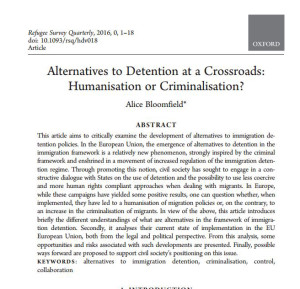This article aims to critically examine the development of alternatives to immigration detention policies. In the European Union, the emergence of alternatives to detention in the immigration framework is a relatively new phenomenon, strongly inspired by the criminal framework and enshrined in a movement of increased regulation of the immigration detention regime. Through promoting this notion, civil society has sought to engage in a constructive dialogue with States on the use of detention and the possibility to use less coercive and more human rights compliant approaches when dealing with migrants. In Europe, while these campaigns have yielded some positive results, one can question whether, when implemented, they have led to a humanisation of migration policies or, on the contrary, to an increase in the criminalisation of migrants. In view of the above, this article introduces briefly the different understandings of what are alternatives in the framework of immigration detention. Secondly, it analyses their current state of implementation in the EU European Union, both from the legal and political perspective. From this analysis, some opportunities and risks associated with such developments are presented. Finally, possible ways forward are proposed to support civil society’s positioning on this issue.
Don’t miss any updates from Kisa!
Support KISA Today
Your donation helps us continue to advocate for a society based on equality and respect for all, and to fight against discrimination and racism.
Cyprus Mail – Kisa

The Supreme Constitutional Court on Monday technically reinstated Kisa, the organisation rallying against racism and discrimination, ruling that a decision five years ago by the court of first instance to scrap the NGO from the register had not been justified. Following the ruling, Kisa will be demanding its immediate implementation with the re-registration of the […] [...]

Parliament’s passing of a bill to create a deputy ministry for migration was met with dissatisfaction by non-governmental organisation Kisa’s executive director, Doros Polykarpou, on Friday. Speaking to the Cyprus Mail he described the creation of such a deputy ministry as “constitutionally questionable,” asking “where does political power lie in terms of government with such […] [...]

A demonstration will be held condemning the attack on the offices of refugee non-governmental organisation (NGO) Kisa on Monday, the alliance against the far-right, racism and fascism said. Kisa’s offices were attacked on Friday, when an improvised explosive device went off outside their offices, smashing windows, destroying computers and photocopiers. In their statement, the protest […] [...]


